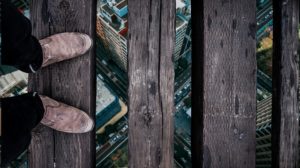Back in October, I did an interview with author Jo-Ann Carson, as part of her Blood, Sweat and Words podcast, which she entitled “Marginalization of Minorities in Genre Fiction.” Listen to the interview, which went live Nov. 20th.
Read my thoughts on originally agreeing to be interviewed for this topic here.
 You know when your mind’s already full of something, you tend to see it everywhere around you? Marginalization isn’t like that. It’s a reality that’s everywhere for many of us, all the time. But sometimes, we do see something in particular that catches our attention because there’s a specific resonance. This Eater article is like that for me. The situation outlined in the article and its themes of appropriation, authenticity, and white privilege are so relevant to my interview with Jo-Ann, that I had to mention it in this post.
You know when your mind’s already full of something, you tend to see it everywhere around you? Marginalization isn’t like that. It’s a reality that’s everywhere for many of us, all the time. But sometimes, we do see something in particular that catches our attention because there’s a specific resonance. This Eater article is like that for me. The situation outlined in the article and its themes of appropriation, authenticity, and white privilege are so relevant to my interview with Jo-Ann, that I had to mention it in this post.
Speaking of that podcast interview…
Originally, I planned this blog post to cover the things that came up for me while I was actually being interviewed, back in October. I didn’t make notes as I was speaking with Jo-Ann, which is fine, but I vaguely recall wanting to note some related points so that I could expand on them. Oh, the best-laid plans.
The truth is that this topic, “marginalization in genre fiction,” is a small drop in the bucket of an enormous ocean of problems, not just in publishing, but in our culture and society: systemic oppression based on racial, sexual, gendered, and physical prejudice. This is a conversation that’s been going on for decades, friends, if not for centuries. The questions of: who gets to speak and for whom; who sets standards and over whom; who is considered human and by whom; who creates the hierarchy and for whom. On and on and on.
My art is writing. My business is publishing. What I do and who I am cannot escape the current constraints of the society and cultures in which I exist. I often find myself the only POC in whatever professional space I’m in. Sometimes, I’m one of two, maybe three, non-white authors waiting for our chance to do what we do, in front of an audience of mostly white people. Marginalization, inclusion, and representation are more than industry trends or buzz words for me and for many of the writers I know, know of, or am lucky to call friends. It’s our reality and our daily hill to die on.
And so I agreed to an interview that focusses these systemic issues through the lens of publishing, which is, of course, just as skewed as any other industry toward having certain people at the top of the hierarchy.
In case it wasn’t clear: I’m not one of those people.
I can’t choose to be one of them—nor would I want to be a white man, frankly. Neither would I want to betray myself, my culture and identity, by playing at whiteness. I’m squarely in the camp of intersectionality, inclusive feminism, and speaking truth to power.
A trusted friend told me this after she listened to the interview: I thought you were very gentle…but I got the impression it was definitely a bit of work for you to be so.
It was hard work giving that interview. Even before I did it, I had to choose to trust Jo-Ann to ask me good questions and to interact with the honest answers I would give her. And to her credit, I think she did a fine job.
At the same time, though it seems nothing more than a question (Can you talk about marginalization and diversity?), there’s risk involved in saying yes, professionally and personally, for me and other marginalized people—especially if we’re women. I don’t control who listens to that interview. I don’t know how anyone who does will react. For some, I’m just another unpleasant woman with strong opinions and the perceived audacity to voice them. We know how some people react to that….

So what would make it worth it for me to take on that risk?
The answer lies with you. It lies with how you engage with this topic and with these issues. Wherever we are on the spectrum of privilege, we can all contribute to centre-ing the people and stories we currently categorize as marginal.
Will you share our stories and amplify our voices? Speak out against prejudice and systemic oppression? Will you help broaden what our current culture deems valuable so that art and creators of all stripes can be celebrated?
Because, at some point, we all need to do the work.
